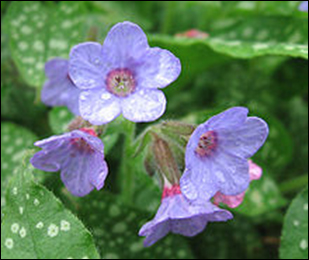What are the Medicinal Properties of Lungwort (Pulmonaria Officinalis)?

Introduction
Lungwort also called Pulmonaria officinalis is a bold plant that has been used since long time throughout the world for treating various lungs ailments. It is a perennial plant that grows well contrasting with other early seasonal plants like Iris, Ferns, Hellebores and Cristata. However these plants cannot be grown everywhere and are native to western Asia and Europe. There are around 18 species of lungwort which grows wildly. However taxonomy of lungwort genus is very confusing. Its botanical name, Pulmonaria is derived from Latin word Pulmo which means lung. While its common name lungwort itself consist of word lung indicating towards its therapeutic importance for lungs. In ancient era a theory called Doctrine of signature was introduced which states that herbs or its parts resembling human organs can help to treat diseases of that organ. Lungwort also came into light at that time for the treatment of pulmonary troubles. Grey spots on the leaves resemble to infected lung. This herb is usually given to treat breathing disorders, intestinal and stomach diseases, urinary tract and kidney ailments. It is also used to treat cough, tuberculosis and relieves retention of fluid.
Do not confuse lungwort with lungmoss, which is a different herb.
General Description
These are perennial, evergreen and herbaceous plants. Its flowers are covered with hair which varies in stiffness and length. It may also bear glands sometimes.The Underground part of this plant consist of rhizome which creeps slowly under the ground and also possesses adventitious roots. These plants are highly sensitive to toxins present in the surrounding environment, hence it grows in unpolluted areas. Thus, the presence of lungwort is indicative of healthy ecosystem. Stems are rough, unbranched, covered with hair and measure around 30cm. These flowering stems spread slightly and are upright in position. Arrangement of leaves is like rosettes and are blue, black or pale green in color. Calyx is five lobed and hairy having shape of a funnel. Lungwort is used by some larve of Lepidoptera species as a food plant.
- Common Name- Lungwort
- Botanical Name- Pulmonaria officinalis
- Family- Boraginaceae
Cultivation
Lungwort is used as a ornamental plant in its native places and hence grown in gardens usually. They grow well in shaded areas having dampness and produces pink or blue flowers in early spring and late winter. It is accompanied by many clusters of leaves that are heart shaped. These leaves are marbled or mottled in the summers.
Part Used
Usually the leaves of the Lungwort plant are used.
Phytochemicals
Typical phytochemicals found in lungwort are Saponins, Quercetin, Tannic acid, Kaempferol, Flavonoids, Catercholtannins, Allantoin and Silicic acid.
Medicinal Properties of Lungwort
- Antioxidant
- Anti-irritant
- Supplement for the lungs
- Digestive
- Diuretic
- Antibiotic
Therapeutic Benefits of Lungwort
- High mucilage content of lungwort relives the respiratory ailments like asthma and chronic bronchitis.
- Owing to its antibiotic properties it prevents and treats the pulmonary infections like tuberculosis, and other bacterial infections in the lungs
- Cold, cough, catarrh can also be relieved by this herb.
- It possesses anti-irritant and soothing qualities which helps to treat irritation or irritating factor in the lungs.
- Lungwort is being used as a traditional medicine for treating respiratory complaints like catarrh, cough, tuberculosis and asthma. Other chest infections can also be treated by this herb.
- Due to number of phytochemicals in it, this plant is a good source of antioxidants. Hence its proper use can help in slowing the aging process and maintain overall wellness. Taking natural antioxidant help in making skin look healthy and younger.
- Having lungwort herb in the form of a tea can be soothing and help to treat many digestive troubles as well. It helps to relieve bloating, gas, acidity, indigestion and diarrhea. Bloating is relieved due to the diuretic activity of this herb which reduces the excessive water from the body.
- Minor wounds and cuts can be treated by lungwort by applying its paste on the affected site.
- Its natural diuretic activity helps to treat recurrent urinary tract infections and other kidney complaints. Owing to the diuretic activity of the herbs the accumulated toxins from the body can be removed.
- Lungwort not only prevent diseases of the respiratory tract but also act as a great natural supplement for lungs. This herb helps to maintain the health and functioning of the lungs.
Side effects of Lungwort
- It might cause an allergic reaction like rashes in some people.
- No other side effects has been evident and can be used safely by anyone. However don’t forget to consult a herbalist or Ayurvedic physician before taking any herb.



